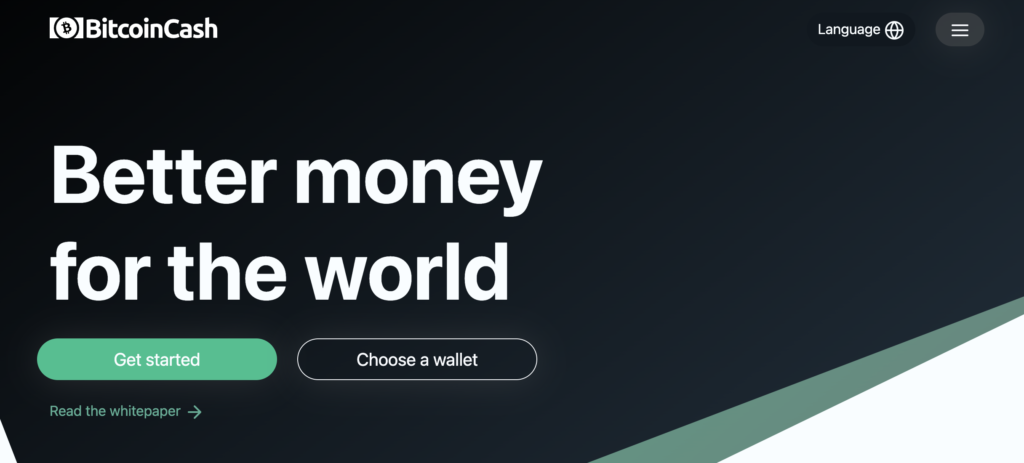Bitcoin Cash (BCH) emerged as a direct response to the scalability challenges faced by Bitcoin. It aims to provide faster and more affordable transactions by increasing the block size, thereby making it a practical alternative for everyday transactions.

History of the Project
Bitcoin Cash was born from a contentious hard fork of Bitcoin in August 2017. The split was primarily driven by disagreements within the Bitcoin community over how to scale the network. While Bitcoin maintained the original 1MB block size, Bitcoin Cash increased it to 8MB, which has since been upgraded to 32MB. This decision was not just a technical divergence but also a philosophical one, emphasizing BCH’s focus on becoming a functional, decentralized currency.
What is Bitcoin Cash?
Bitcoin Cash is designed as a peer-to-peer electronic cash system that aims to restore the original vision of Satoshi Nakamoto for a fast, reliable, and low-cost network. By increasing the block size, BCH seeks to handle more transactions per second than its predecessor. This approach primarily targets improvements in transaction speed and cost, addressing the limitations that had plagued Bitcoin as it grew more popular.
How Bitcoin Cash Differs from Bitcoin
Bitcoin Cash (BCH) was created as a result of a hard fork from Bitcoin (BTC) in August 2017, primarily due to disagreements within the Bitcoin community about how best to scale the network. While both share the same underlying technology and early blockchain history up to the point of the fork, there are several fundamental differences that distinguish Bitcoin Cash from its predecessor.
Block Size Limit
The most significant technical difference is the block size limit. Bitcoin Cash supports a block size of up to 32MB, compared to Bitcoin’s 1MB (which can be effectively up to 4MB after the implementation of Segregated Witness, or SegWit). This larger block size allows Bitcoin Cash to process a higher number of transactions per block, aiming to improve scalability and reduce transaction fees.
Transaction Fees and Speed
Due to its larger block size, Bitcoin Cash can handle more transactions per second than Bitcoin. This capacity increase typically results in lower transaction fees and faster processing times, making BCH more suitable for everyday transactions and microtransactions. In contrast, Bitcoin, with its smaller block size, often experiences higher transaction fees and longer processing times during periods of heavy network congestion.
Economic Vision
Bitcoin Cash positions itself as true “electronic cash” in accordance with Satoshi Nakamoto’s original vision for Bitcoin. It emphasizes becoming a medium for daily transactions. Bitcoin, on the other hand, has evolved to be seen more as a “store of value” or “digital gold,” partly due to its perceived scarcity and long-term appreciation.
Development Philosophy
The development communities of Bitcoin and Bitcoin Cash also differ in their philosophies and approaches to network upgrades. Bitcoin maintains a conservative approach to changes, emphasizing security and network stability. Bitcoin Cash, however, adopts a more progressive stance, willing to implement significant changes to its protocol to enhance scalability and functionality, such as increasing the block size or adding new transaction features.
Security and Mining
Both Bitcoin and Bitcoin Cash use the Proof of Work (PoW) consensus mechanism, but the difference in block size affects the mining strategies. Bitcoin Cash’s larger block size can potentially lead to quicker validation and easier mining, but it also raises concerns about the security and centralization of mining activities, as larger blocks might favor larger mining pools with more resources.
Network Effects
Bitcoin benefits from broader recognition and greater adoption, having established a strong brand and community since its inception in 2009. It is more widely supported by financial institutions, has a larger developer community, and is featured more prominently on cryptocurrency exchanges. Bitcoin Cash, while maintaining a robust community, faces challenges in achieving the same level of mainstream recognition and adoption.
How Bitcoin Cash Works?
Blockchain Technology
Bitcoin Cash operates on a modified version of Bitcoin’s original blockchain architecture, distinguished primarily by its increased block size limit. Originally set to 8MB at its inception in 2017, this limit was expanded to 32MB in 2018. This expansion allows the network to process transactions more efficiently by fitting more transactions into each block. Unlike Bitcoin, which aims to maintain smaller block sizes to preserve decentralization by allowing more users to participate in network validation, Bitcoin Cash opts for larger blocks to optimize transaction throughput and reduce fees, which is crucial for its utility in everyday transactions.
Consensus Mechanism
Bitcoin Cash uses the same Proof of Work (PoW) mechanism as Bitcoin, relying on miners to secure the network and validate transactions. Miners compete to solve complex mathematical problems, and the first to solve the problem gets the right to add a new block to the blockchain. This method, while secure and proven, has drawn criticism for its high energy consumption, prompting ongoing discussions within the community about possible future shifts towards more sustainable consensus mechanisms.
Technical Enhancements in Consensus
To improve the responsiveness and stability of the mining process, Bitcoin Cash introduced a novel difficulty adjustment algorithm called the “Aserti3-2d” (or ASERT) in 2020. This algorithm adjusts the mining difficulty more predictably than Bitcoin’s mechanism, which only adjusts every 2016 blocks. ASERT recalculates the difficulty every block, using a moving window of the previous 144 blocks. This adjustment helps maintain consistent block times even as mining power fluctuates, which is particularly important for a network aiming to handle a higher volume of transactions.
Smart Contract Capabilities
Although Bitcoin Cash was not initially focused on smart contracts, recent developments have seen it incorporate these capabilities to broaden its use cases. The introduction of the Simple Ledger Protocol (SLP) has enabled the creation and management of tokenized assets on the BCH blockchain. Furthermore, the aforementioned SmartBCH sidechain extends Bitcoin Cash’s functionality to support Ethereum-compatible smart contracts and decentralized applications, leveraging the security of BCH with the versatility of Ethereum’s programming capabilities.
Distinctive Features
A key differentiator for Bitcoin Cash from other cryptocurrencies, including its progenitor Bitcoin, is its pragmatic approach to scalability and transaction fees. By opting for larger block sizes, Bitcoin Cash positions itself as more accommodating for everyday transactions and microtransactions, due to lower fees and faster confirmation times. Additionally, Bitcoin Cash emphasizes maintaining an uncensored network where all transactions are treated equally, which reinforces its vision as true digital cash.
Tokenomics of Bitcoin Cash
Coin vs. Token
Bitcoin Cash (BCH) is classified as a coin, not a token. This distinction is crucial as BCH operates on its own blockchain and serves as the native currency of the Bitcoin Cash network, similar to how Bitcoin operates on its own original blockchain. Unlike tokens, which are typically issued on top of another blockchain like Ethereum, coins have their own independent ledger and transaction validation system.
Emission Model and Block Rewards
The emission model of Bitcoin Cash follows the same protocol established by Bitcoin, based on a predefined halving schedule. Initially, miners received 12.5 BCH per block mined. This reward halves approximately every four years, mirroring Bitcoin’s approach to control inflation. The most recent halving occurred in April 2020, reducing the block reward to 6.25 BCH. This process will continue until the total supply cap of 21 million BCH is reached, aiming to create scarcity and potentially drive up the coin’s value over time, similar to Bitcoin’s economic model.
Transaction Fees
In addition to block rewards, miners earn transaction fees, which are paid by users to have their transactions included in a block. Due to the larger block sizes, the average transaction fee on the Bitcoin Cash network tends to be significantly lower compared to Bitcoin. This makes BCH more practical for smaller, everyday transactions, adhering to its vision as a functional digital cash system.
Current Market Dynamics
The price of Bitcoin Cash, like most cryptocurrencies, is influenced by a variety of factors including market demand, macroeconomic indicators, regulatory news, and technological developments within the network. Since its inception, BCH has experienced significant volatility but remains one of the top cryptocurrencies by market capitalization. Its price movements often correlate with those of Bitcoin, although the degrees of fluctuation can differ due to distinct community support and technological developments.
Long-Term Supply Strategy
The long-term economic strategy of Bitcoin Cash is designed to benefit from reduced inflation over time. The predictable decrease in block rewards is intended to counterbalance potential downward pressure on the value of BCH due to increasing supply. This model encourages early adoption and long-term holding, theoretically increasing demand versus the gradually decreasing supply.
In summary, the tokenomics of Bitcoin Cash are designed to ensure it functions efficiently as digital cash. By maintaining a strict emission schedule and offering low transaction fees, BCH aims to remain competitive among cryptocurrencies intended for everyday use while also managing inflation and encouraging investment.
Where to Buy Bitcoin Cash?
Bitcoin Cash (BCH) is widely available on several major cryptocurrency exchanges, making it accessible to a broad audience globally. Here are some of the primary platforms where you can purchase BCH:
- Binance: As one of the largest and most popular cryptocurrency exchanges globally, Binance offers BCH trading pairs with major cryptocurrencies and fiat currencies, providing liquidity and various trading options.
- HTX (formerly Huobi): HTX supports BCH and frequently updates its trading systems to offer a robust trading experience. It’s known for its security measures and has a significant user base in Asia.
- MEXC Global: Known for offering a wide variety of trading pairs, MEXC Global includes BCH in its listings. This platform is appreciated for its user-friendly interface and competitive trading fees.
- Bybit: While primarily focusing on derivatives, Bybit also offers spot trading for BCH. It is suitable for those looking to engage in both spot and derivative trading in one place.
- KuCoin: This exchange is known for supporting a vast number of cryptocurrencies, including BCH. KuCoin is favored for its easy-to-use interface and effective customer support.
- Bitfinex: Offering sophisticated trading features, Bitfinex caters to more experienced traders with BCH trading options. It’s renowned for its high liquidity and professional trading environment.
These exchanges provide various tools for trading, such as spot trading, futures, and options, catering to different investment strategies and risk preferences.
Where to Store Bitcoin Cash?
Hardware Wallets
- Ledger Nano S/X: These hardware wallets are among the most secure options for storing Bitcoin Cash, as they keep your BCH offline and protect them from online threats. Ledger devices also support other cryptocurrencies, which means you can manage multiple assets with the same device.
- Trezor Model T: Another secure hardware wallet, the Trezor Model T provides excellent security by storing your private keys offline. It features a touchscreen for enhanced user interaction and supports numerous other cryptocurrencies.
Software Wallets
- Bitcoin.com Wallet: This wallet is specifically designed for Bitcoin Cash and offers a user-friendly interface for managing BCH. It supports both mobile and desktop platforms, making it accessible for everyday use.
- Electron Cash: A fork of the popular Electrum Bitcoin wallet, Electron Cash allows you to control your private keys without storing them on a server. It offers features like multisig security and compatibility with hardware wallets.
Mobile Wallets
- Jaxx Liberty Wallet: This mobile and desktop wallet supports BCH and many other cryptocurrencies. Jaxx offers an intuitive interface and integrates additional features like a blockchain news reader and a cryptocurrency exchange.
Full Node Wallet
- Bitcoin Cash Node: For those interested in supporting the BCH network more directly, running a full node wallet like Bitcoin Cash Node allows you to validate transactions and blocks independently. This option requires more technical knowledge and resources but provides complete control over the transaction verification process.
Choosing the right storage option for Bitcoin Cash depends on your specific needs, such as the level of security desired, ease of access, and additional features like transaction anonymity or multi-asset support. Hardware wallets are typically recommended for large amounts or long-term storage due to their enhanced security features, while software and mobile wallets offer more convenience for everyday transactions.
Advantages and Disadvantages of Bitcoin Cash
Advantages
- Increased Scalability: One of the primary advantages of Bitcoin Cash is its increased block size, which allows it to process more transactions per block compared to Bitcoin. This scalability solution means faster transaction processing times and lower fees, making BCH more suitable for daily transactions and microtransactions.
- Low Transaction Fees: Due to the capability to handle more transactions per block, Bitcoin Cash typically offers much lower transaction fees than Bitcoin. This is particularly beneficial for users looking to perform small or regular transactions without incurring significant costs.
- Enhanced Transaction Speed: The larger block size of Bitcoin Cash also translates into faster transaction speeds during times of congestion. While Bitcoin transactions can become slower and more expensive when the network is busy, BCH maintains quicker processing times, ensuring a more consistent user experience.
- Commitment to Sticking to Original Bitcoin Philosophy: Bitcoin Cash adheres to what it claims is the original vision of Bitcoin: a peer-to-peer electronic cash system as envisioned by Satoshi Nakamoto. This commitment appeals to those who favor a digital currency that serves as practical, everyday money.
Disadvantages
- Lower Security and Potential Centralization: The larger block size in Bitcoin Cash could potentially lead to issues of centralization, as the resource requirements for mining and running full nodes are higher compared to Bitcoin. This can lead to a smaller number of miners controlling a significant portion of the network, which may impact security and decentralization.
- Lesser Recognition and Adoption: Although Bitcoin Cash is well-known within the cryptocurrency community, it does not enjoy the same level of recognition or adoption as Bitcoin. This affects everything from user base size to the availability of services, tools, and integrations that support or use BCH.
- Volatility and Uncertainty: Like many cryptocurrencies, Bitcoin Cash faces issues of price volatility and market fluctuations. However, it also deals with additional layers of uncertainty from within its own community regarding development directions and protocol upgrades, which can influence stability and confidence.
- Reduced Network Effects: Bitcoin’s established network effect — with more exchanges, wallets, and payment services supporting it — provides it with a substantial competitive advantage. Bitcoin Cash, by contrast, has a smaller ecosystem, which can limit both user adoption and general market penetration.
In summary, Bitcoin Cash offers significant benefits for those looking for fast, affordable digital transactions but faces challenges regarding security, adoption, and recognition in the broader financial landscape. These factors must be weighed carefully by users and investors when considering Bitcoin Cash as part of their cryptocurrency portfolio.
Future Prospects and Development Forecast
Growth Foundations
The growth of Bitcoin Cash primarily rests on its ability to serve as a practical, everyday payment method. Its increased block size allows for more transactions per block, reducing fees and processing times compared to Bitcoin. This technical advantage positions BCH as an attractive alternative for users and merchants looking for efficient digital transactions.
Clients and Partners
Bitcoin Cash has garnered support from a range of clients and partners across various sectors. Notable among these are payment processors and financial service providers that integrate BCH for its low transaction fees and fast confirmation times. Key partnerships include:
- BitPay: This leading payment processor supports BCH, enabling businesses to accept Bitcoin Cash payments seamlessly.
- PayPal: By including BCH in its cryptocurrency offerings, PayPal allows users to buy, hold, and sell Bitcoin Cash within its platform, significantly broadening its accessibility.
- Travala: As a cryptocurrency-friendly travel booking platform, Travala accepts BCH, promoting its use in the travel industry.
These partnerships are pivotal for BCH as they enhance its utility and acceptance in everyday commerce, driving user adoption and network growth.
Development Forecast
The future development of Bitcoin Cash focuses on enhancing its scalability and utility. Ongoing projects aim to further reduce transaction times and fees, making BCH more competitive against both traditional financial systems and other cryptocurrencies. Additionally, the development of smart contract functionalities through platforms like SmartBCH could open new avenues for decentralized applications on the BCH network, potentially attracting a new user base interested in blockchain development.
Ecosystem
The Bitcoin Cash ecosystem comprises a variety of components that support its functionality and expansion:
- SmartBCH: A sidechain for Bitcoin Cash that enables Ethereum-compatible smart contracts, broadening the scope of BCH’s applications.
- Bitcoin Cash Node: A prominent software implementation of the BCH protocol, which plays a critical role in maintaining the decentralization and robustness of the network.
- SLP (Simple Ledger Protocol): This protocol allows the creation of tokens on the Bitcoin Cash blockchain, facilitating the development of new digital assets and applications.
- CashFusion: A privacy-enhancement feature that provides more anonymity for BCH transactions than traditional Bitcoin transactions.
- Neutrino: A privacy-focused BCH wallet that allows users to maintain control over their private keys without sacrificing usability.
The continual development of these and other projects within the Bitcoin Cash ecosystem is crucial for maintaining its relevance and competitiveness in the rapidly evolving cryptocurrency market. The integration of advanced blockchain functionalities, coupled with strategic partnerships, sets the stage for BCH to potentially increase its market share among both private users and commercial enterprises.
Conclusion
Bitcoin Cash represents a pivotal evolution in the history of cryptocurrencies. Its technological adaptations and strategic decisions continue to influence its trajectory in the digital currency space. As it evolves, BCH must balance its foundational principles with innovative practices to remain competitive and relevant in the increasingly crowded blockchain arena. For advanced users and investors, understanding these nuances is crucial in assessing Bitcoin Cash’s long-term potential and strategic value.






